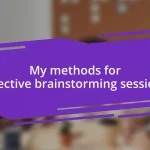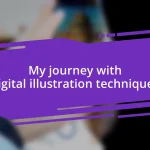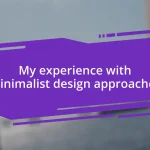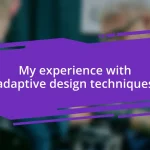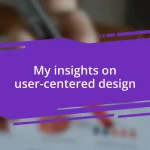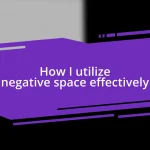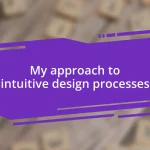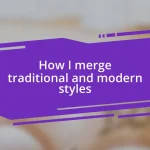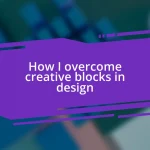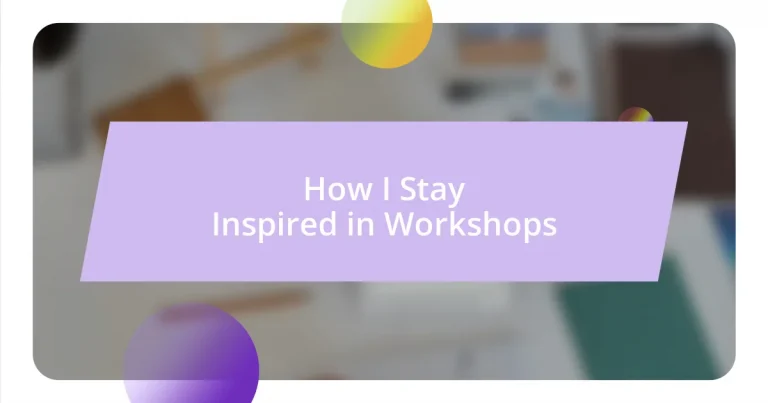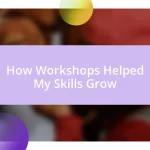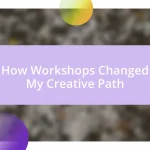Key takeaways:
- Finding workshop purpose involves introspection, connection, and understanding the impact you aspire to have on participants.
- Setting clear goals and revisiting them post-workshop enhances focus, participant engagement, and overall satisfaction.
- Creating a supportive environment through trust, open dialogue, and celebrating contributions fosters creativity and collaboration among participants.
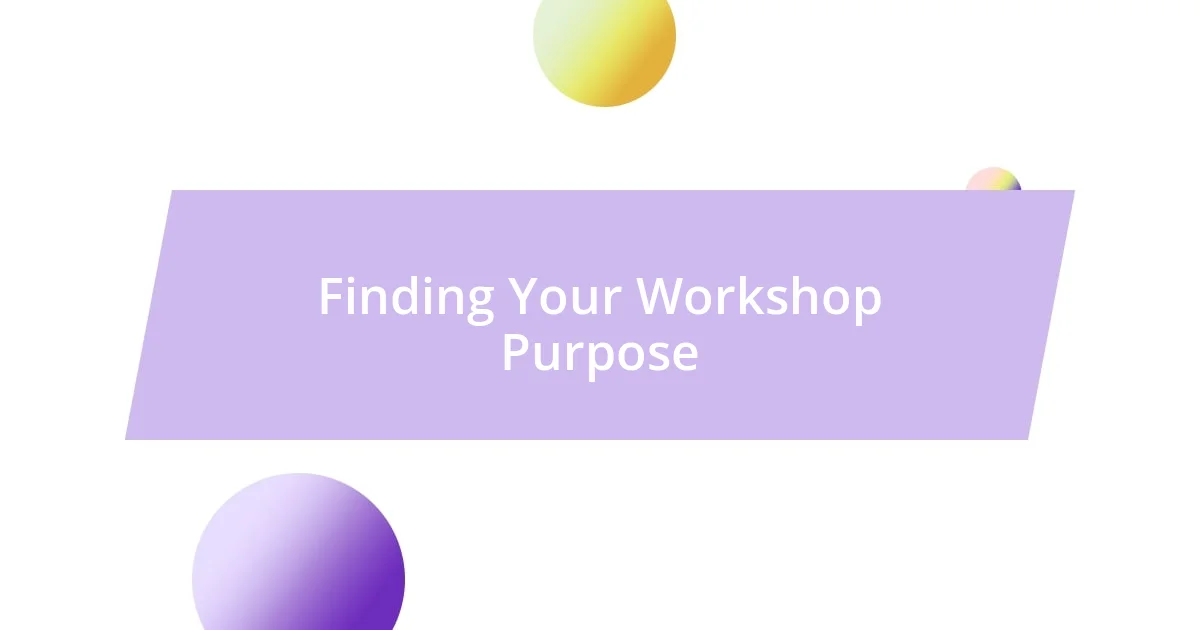
Finding Your Workshop Purpose
Finding your workshop purpose begins with introspection. I often ask myself what truly excites me about the topic at hand. For instance, during a recent workshop, I discovered my passion for storytelling when I felt a warm thrill at sharing my journey with others. Isn’t it fascinating how a simple question can unlock a deeper understanding of our motivations?
As I reflect on past workshops, I remember a specific moment where I realized the importance of connection. I was facilitating a session, and one participant’s eyes lit up when I shared a personal struggle. That warmth brought our group together, reminding me that sharing our vulnerabilities often helps us find greater purpose. Have you ever experienced that magical feeling of creating a safe space?
Finding purpose isn’t just about what you want to teach; it’s about the impact you aspire to have. I think of my purpose as a beacon—challenging yet guiding. The workshops where I felt truly fulfilled were those where I saw participants leave with new insights or that “aha” moment. How does your vision resonate with the needs of others? Exploring this intersection can illuminate your workshop purpose like nothing else.
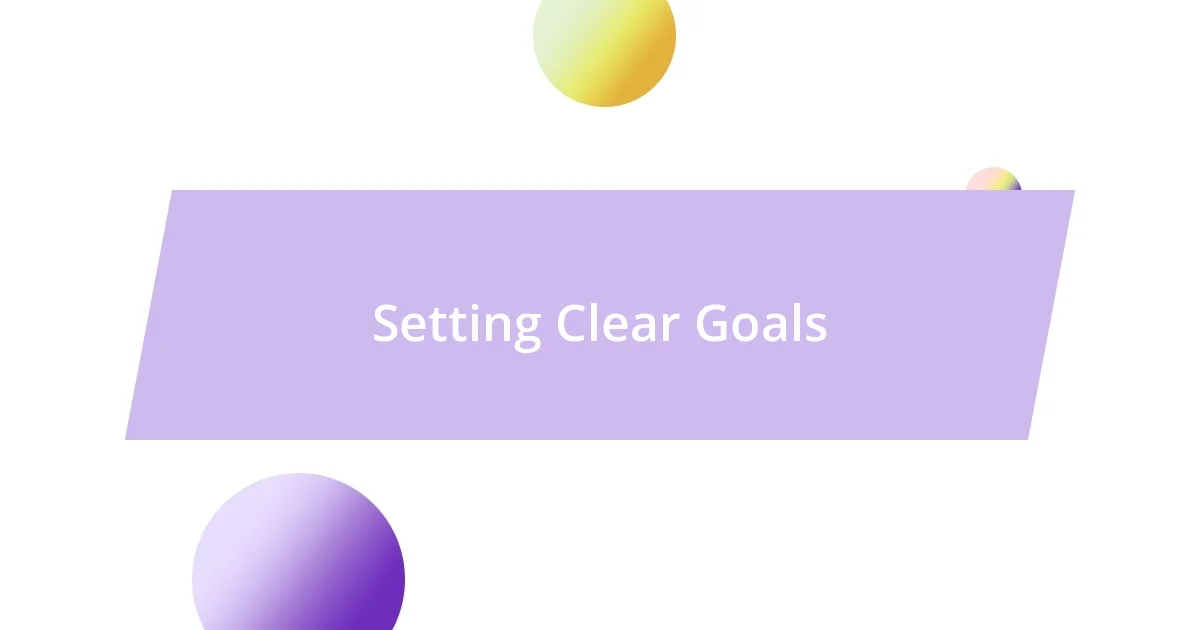
Setting Clear Goals
Setting clear goals is essential for maintaining focus during workshops. I vividly recall a workshop where I set a goal to enhance participants’ creative skills. By defining this goal ahead of time, I structured my activities to foster creativity. The result was invigorating; participants immersed themselves, producing ideas that surprised even me. It’s remarkable how setting a clear intention gives everyone a target to aim for, creating an uplifting momentum.
On another occasion, I attended a workshop where the facilitator laid out specific goals at the start. They differentiated between primary and secondary goals, which I found particularly helpful. Primary goals focused on core skills, while secondary goals encouraged exploration of related topics. This clear distinction allowed me to engage more deeply with the subject, maximizing my learning experience. Have you ever walked away from a workshop thinking, “Wow, I wish I had a clearer sense of what I was meant to achieve”? It’s this clarity that fosters satisfaction and a sense of accomplishment.
Finally, I realize that revisiting my goals is just as important as setting them. After each workshop, I take a moment to reflect on how I met my objectives. For instance, after leading a session on digital marketing, I evaluated whether I’d succeeded in demystifying analytics for everyone. This reflection not only helps me refine my goals for future workshops but also inspires me to deepen my connection with participants, ensuring they leave with tangible takeaways. How do you measure your success after a workshop?
| Goal Setting Aspect | Personal Experience |
|---|---|
| Initial Clarity | I structured activities to foster creativity, leading to surprising outcomes. |
| Goal Differentiation | Primary goals focused learning, while secondary ones invited exploration. |
| Post-Workshop Reflection | I often assess if my objectives were met to refine future workshops. |
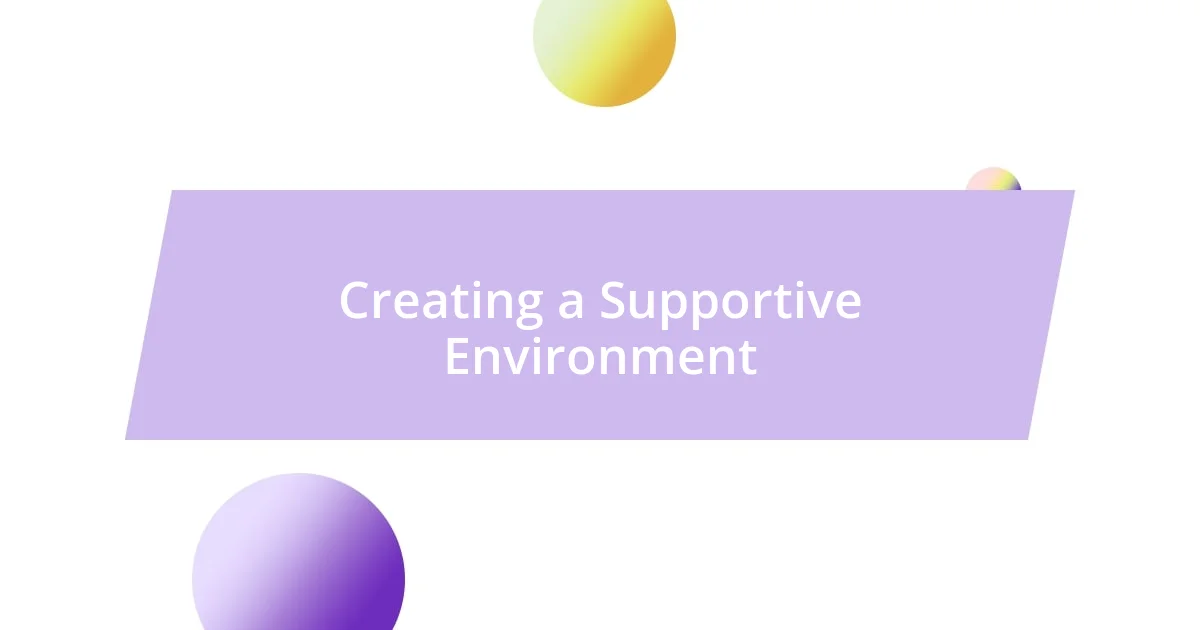
Creating a Supportive Environment
Creating a supportive environment is crucial for nurturing creativity and collaboration in workshops. I remember one particular workshop where the atmosphere felt almost electric—the participants were genuinely engaged, fostering a sense of camaraderie. It struck me how powerful encouragement can be. When individuals feel safe and valued, they’re more likely to share their thoughts and ideas freely.
Here are some practical ways I’ve found effective in building that supportive space:
-
Establish Trust: Open the session with a brief team-building activity that allows participants to get to know each other. I once had everyone share a fun fact about themselves, and it made a world of difference in breaking the ice.
-
Encourage Open Dialogue: I’ve noticed that when I invite questions and promote discussion, participants are more willing to express their thoughts and feelings. This openness has often led to deeper, more meaningful conversations.
-
Celebrate Contributions: Whenever someone shares a unique idea or perspective, I make it a point to acknowledge and celebrate that contribution. This small gesture can elevate the entire experience, encouraging others to join in fearlessly.
In creating this type of environment, I have witnessed firsthand how the energy shifts. You can feel the moment when participants transition from hesitant strangers to enthusiastic collaborators, and it’s truly magical.
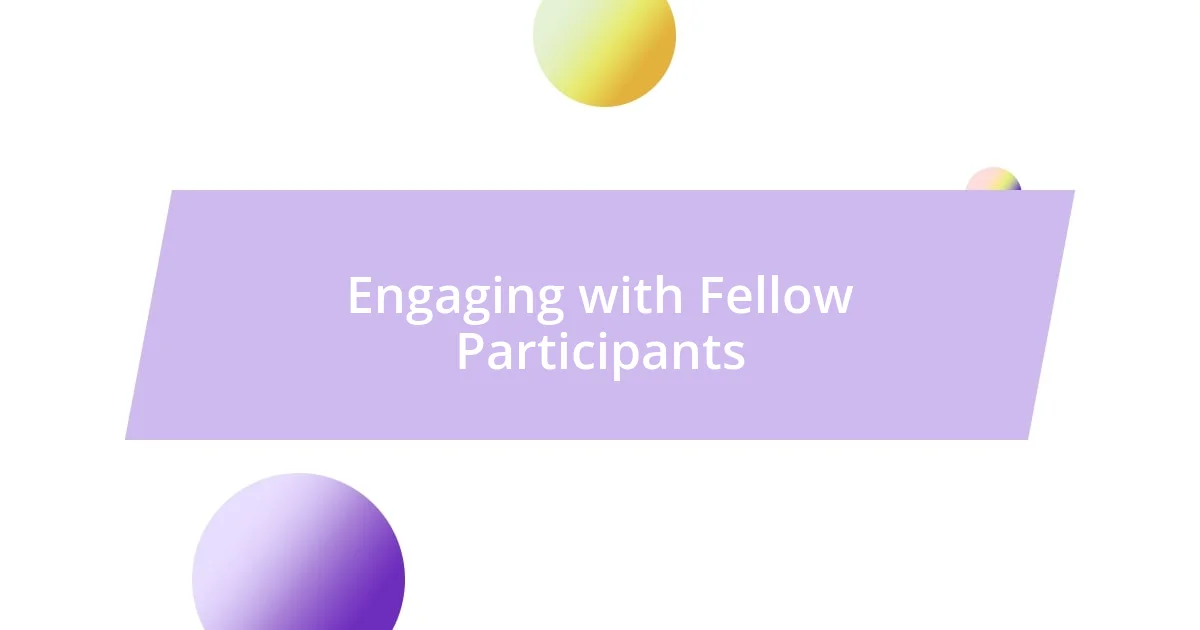
Engaging with Fellow Participants
Engaging with fellow participants is one of the most rewarding aspects of any workshop experience. I often find myself reflecting on a workshop where we formed small discussion groups. It was fascinating to see ideas bouncing around the room, sparking connections between participants. I remember one participant sharing a personal story that opened up deeper conversations about vulnerability and creativity. Isn’t it amazing how a single anecdote can shift the dynamics of a group?
Throughout my journey, I’ve learned the importance of active listening during these engagements. When I truly tune in to what others are saying, it invites them to be more open and authentic. I recall a workshop where I made a conscious effort to ask follow-up questions based on my colleagues’ inputs. This practice not only strengthened our bond but also helped me grasp varied perspectives that enriched my understanding of the topic. Have you ever felt that rush of inspiration when you realize someone else’s experience mirrors yours?
Building connections often requires stepping outside our comfort zones. I vividly remember a moment when I approached someone I hadn’t interacted much with, and we ended up having a profound conversation about our professional journeys. That simple act of reaching out not only expanded my network but also fueled my creativity for weeks. Why not take a chance next time at a workshop? Engaging with others can be the spark you need to ignite fresh ideas and insights.
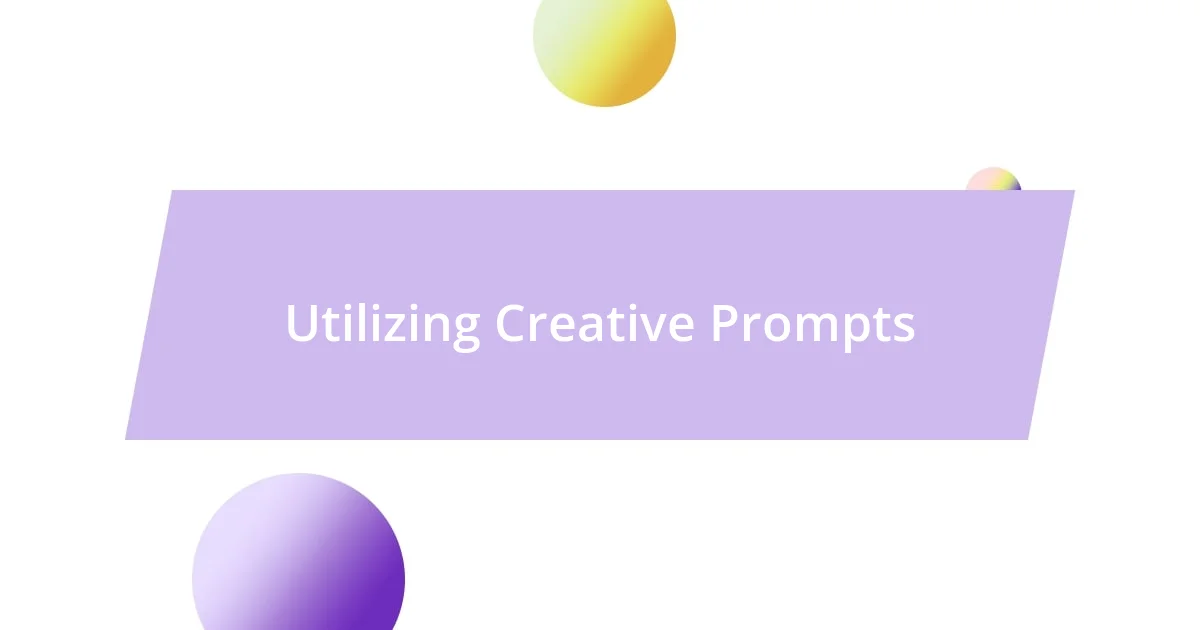
Utilizing Creative Prompts
Utilizing creative prompts has always been a game-changer for me in workshops. I recall a session where we were given the prompt to “describe a holiday destination that has impacted our lives.” As I closed my eyes and let memories wash over me, the ideas started flowing. I realized how effective a simple suggestion can be at unlocking hidden thoughts and emotions, helping me to articulate feelings I hadn’t thought about in years. Have you ever noticed how, sometimes, all it takes is a nudge to dig deeper into creativity?
In one memorable workshop, we used visual prompts—images of landscapes and abstract art—which sparked surprising stories and connections among participants. When I spotted a picture of a beach at sunset, I felt transported back to a time when I felt both exhilaration and peace. This personal tie not only inspired my own creativity but also moved others to share their stories, creating this ripple effect that amplified everyone’s engagement. It was like we were weaving a tapestry of experiences, each thread richer and more intricate than the last.
I also enjoy using fun prompts, like word association games, to challenge myself and break through mental blocks. I remember one instance where we went around the table, quickly shouting out words related to “freedom.” By the time it was my turn, a whirlwind of thoughts flooded my mind—travel, sunsets, dreams—all culminating in a moment of clarity that propelled my creative process forward. How often do we deprive ourselves of those spontaneous bursts of inspiration? Embracing prompts like these can ignite a newfound passion and redefine our paths in creativity.
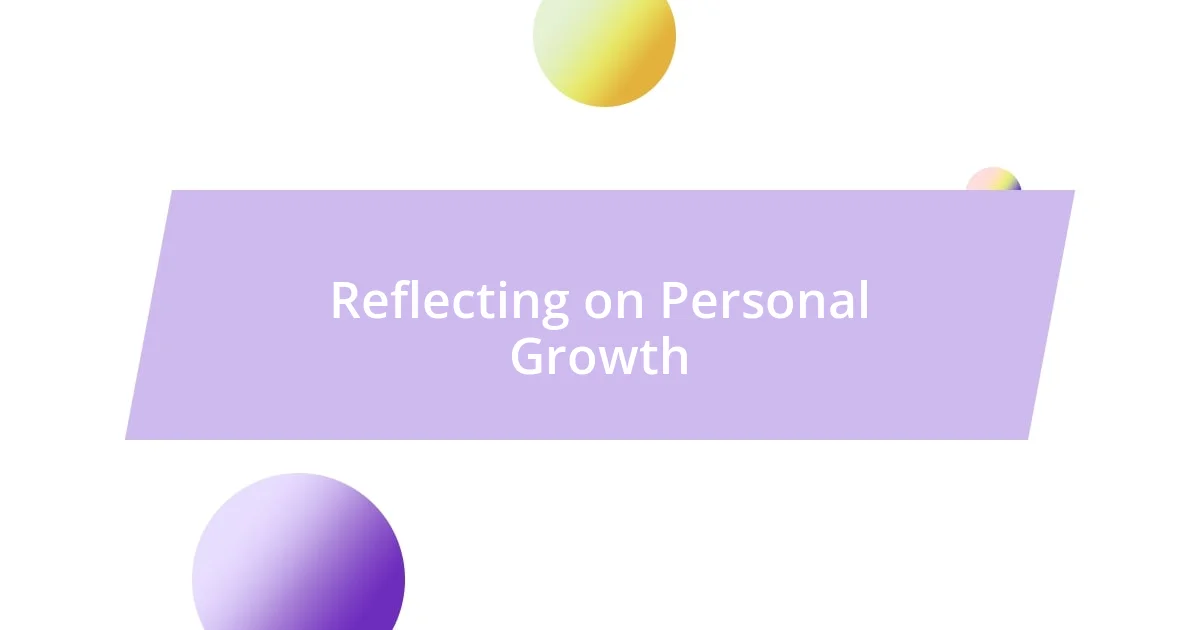
Reflecting on Personal Growth
Reflecting on personal growth can be a bit like piecing together a puzzle—you only see the full picture after stepping back. I remember a workshop where I was tasked with sharing my biggest challenge from the past year. As I spoke about facing my fear of public speaking, I felt a mix of vulnerability and strength. That moment made me realize how much I had grown, transforming a fear into an opportunity for connection and expression. Have you ever shared a fear in a safe space and felt both terrified yet liberated?
During another session, I found myself engaged in self-assessment activities that prompted introspection. We explored questions like, “What beliefs have shaped my journey?” and “How have setbacks defined my path?” Reflecting on these aspects led me to acknowledge not just my accomplishments but also the lessons learned from my failures. I distinctly remember that sense of clarity when I recognized how each setback—though painful at the time—had equipped me with resilience. Does it resonate with you when you recognize how your struggles pave the way for future growth?
What truly struck me was the realization that personal growth is never a straight line; it’s more like a winding road. After a particularly insightful workshop, I took some time to journal my experiences. As I wrote, connections sparked between what I learned about myself and my aspirations for the future. Looking back, those reflections have become a guiding light, reminding me of how far I’ve come and where I still want to go. Have you ever set aside time to reflect and felt that spark ignite again, reminding you of the endless possibilities ahead?
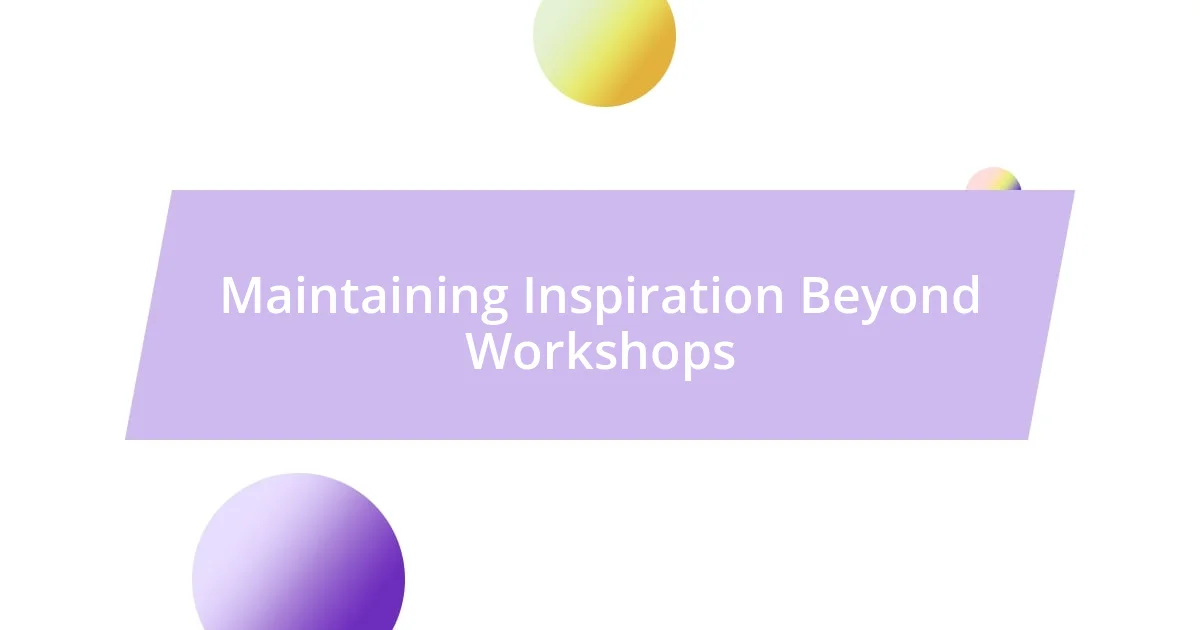
Maintaining Inspiration Beyond Workshops
Maintaining the inspiration I’ve built in workshops often requires a bit of intentionality. I find that jotting down my workshop takeaways in a dedicated journal keeps those moments alive for me. Just recently, I came across an entry about a lively discussion we had on creative storytelling. Reading those words reignited my passion, reminding me of the excitement I felt during that exchange. Have you ever reread your notes from a workshop and felt that same rush of inspiration wash over you?
Another approach that works well for me is setting regular check-ins with myself to reflect on my progress and creativity. I carve out time every month to revisit what fueled my inspiration during those sessions and ask myself how I can incorporate those insights into my daily routine. Last month, I noted a surge in my creative flow whenever I listened to music that resonated with feelings shared in workshops. Isn’t it fascinating how the right soundtrack can transport you back to those enlightening moments?
I’ve also learned the power of connecting with fellow workshop participants beyond the event itself. I remember forming a small virtual group with a few attendees from a recent workshop, where we share our creative projects and challenges. Each time we meet, it feels like I’m reigniting the spark of inspiration that initially drew us together. How about you? Have you considered nurturing those connections? Keeping that community alive has proven to be a consistent source of encouragement for all of us.
